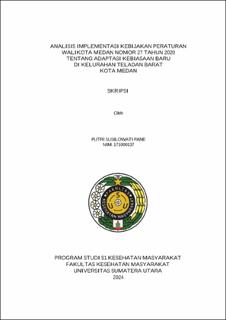| dc.description.abstract | The rapid spread of COVID-19 has significantly impacted public health, with 1,626,812 cases reported nationally by April 2021. North Sumatra Province recorded 28,875 cases, placing it among the 15 provinces with the highest numbers. To curb the spread, the new normal policy was introduced, promoting behavioral changes while maintaining health protocols. However, its implementation has been ineffective, as many Indonesians have not fully adapted. Data from November 2020 showed only 58.32% of the population consistently wore masks, and 43.46% practiced social distancing. A preliminary survey at Teladan Barat Village indicated that many residents did not follow the new normal due to lack of understanding and disbelief in COVID-19. This study aims to analyze the implementation of Medan Mayor Regulation No. 27 of 2020 about the adaptation of new normal at Teladan Barat Village. This research is using qualitative approach with factors affecting policy implementation; communication, resources, disposition, and bureaucracy. Informants include members of the COVID-19 Task Force, the Rapid Response Team, and local residents. The study concludes that the policy was ineffective due to poor public communication, insufficient staff, and weak enforcement. The Medan City Government is recommended to enhance public outreach, allocate human resources, provide training, and improve the coordination between institutions. | en_US |


